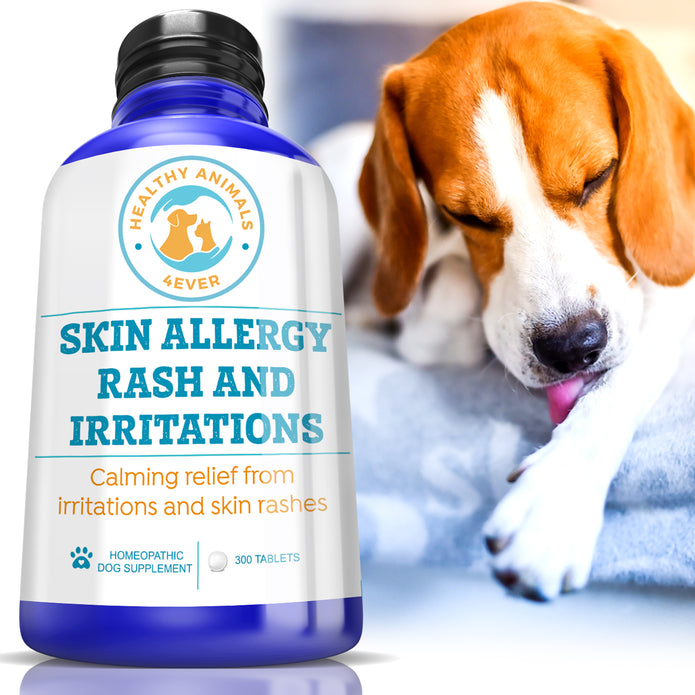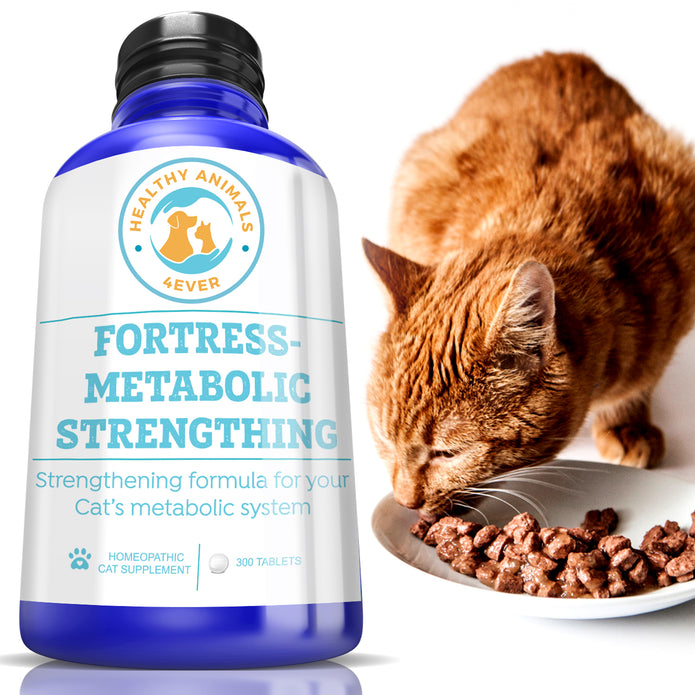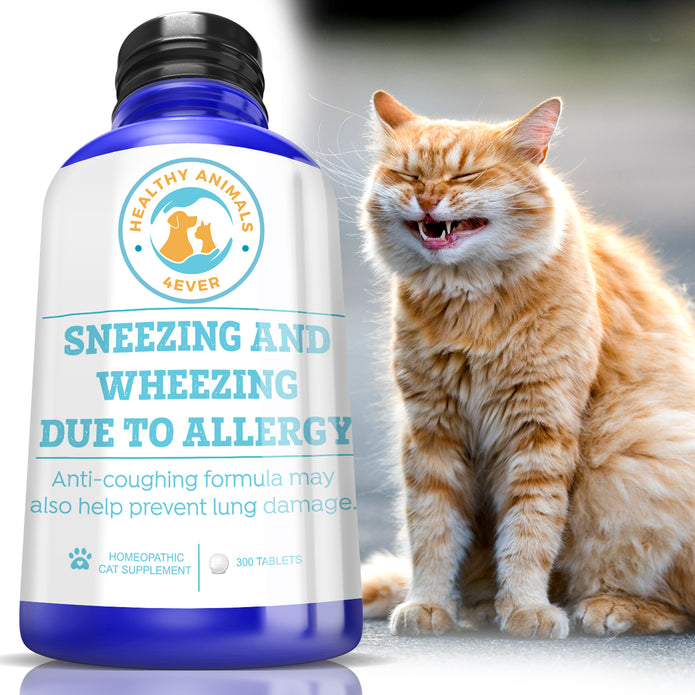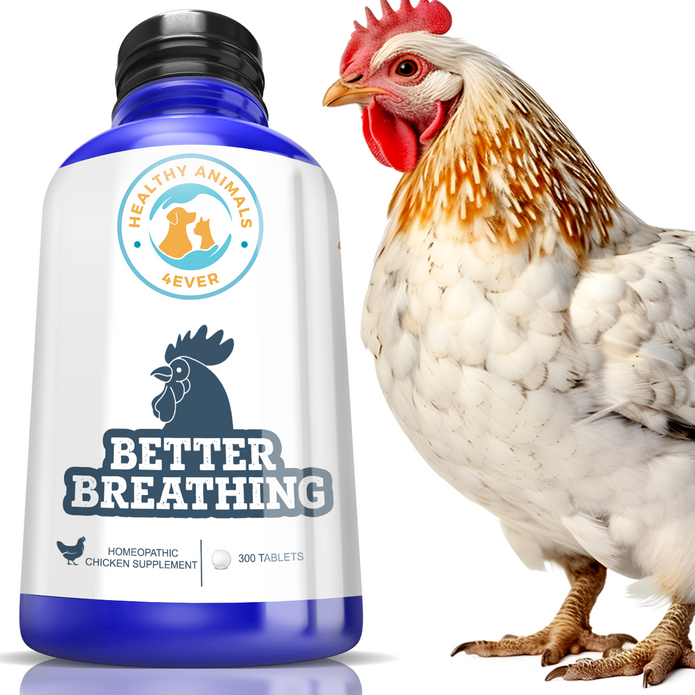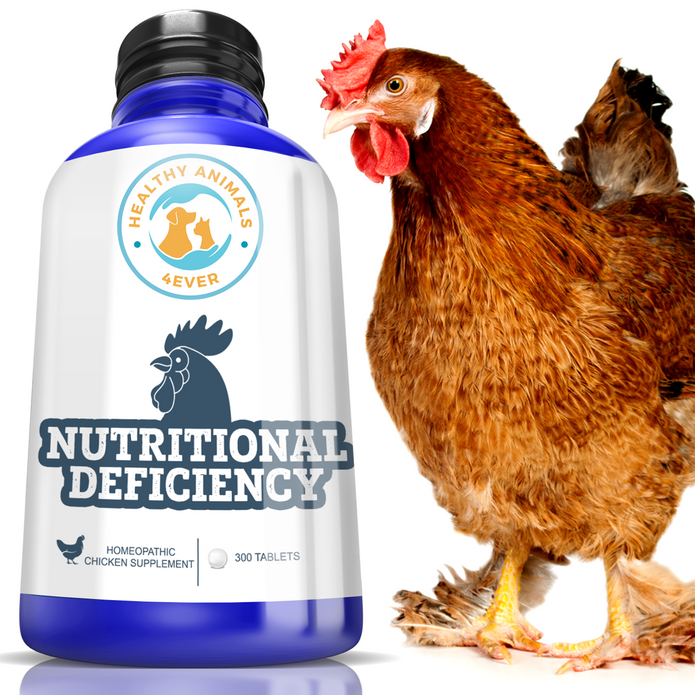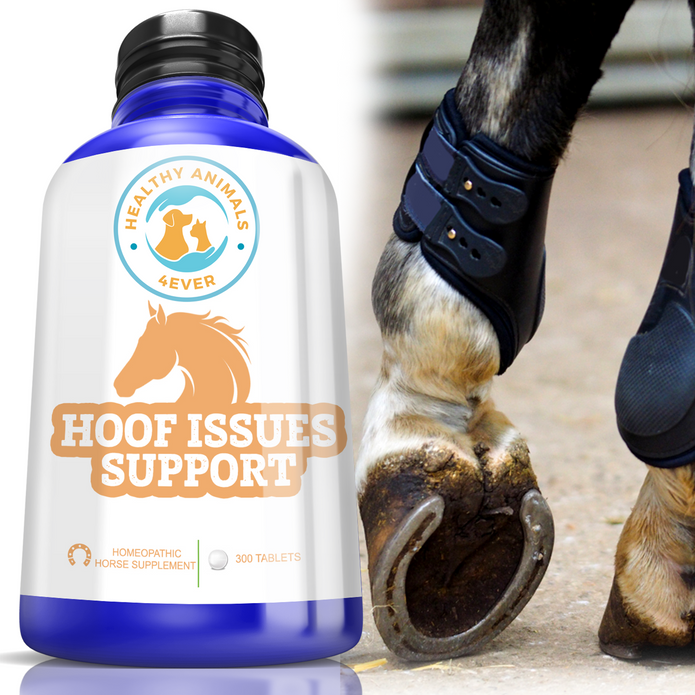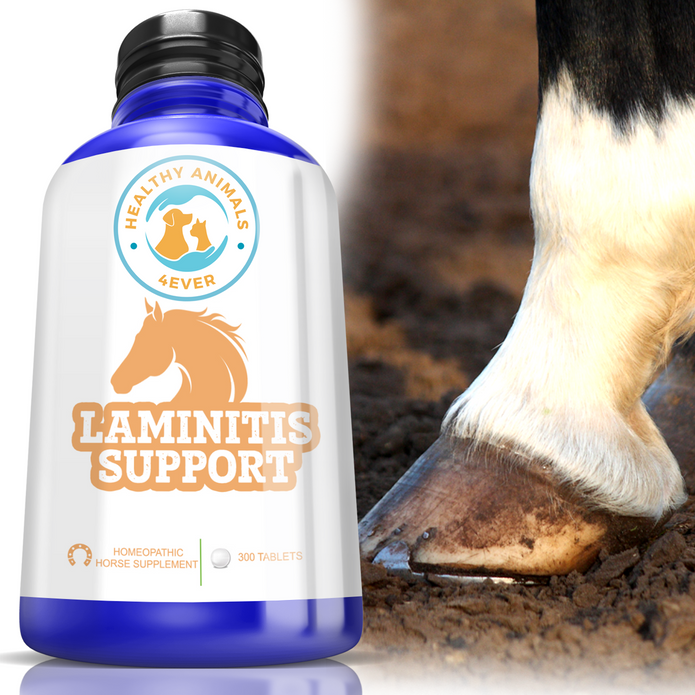Springtime Pet Wellness: Holistic Tips for Dogs, Cats, Chickens, and Horses
Do you want to help your pets thrive this spring? With the change of season, it's essential to adapt our care routines to meet the specific needs of our pets. Each species requires special attention to maintain optimal health and wellness, from dogs and cats to chickens and horses.
In this blog, we'll explore simple yet effective natural remedies and homeopathic tips to support your pets through the transition into spring. We'll address concerns like allergy relief, parasite prevention, and immune support.
Join us and nurture your pets' well-being naturally this season!
Skin Allergy Rash and Irritations is a natural allergy remedy for all dogs. Helps heal irritated & infected skin. It may provide relief from insect bites. Provides a calming effect. All-natural formula. Easy to use.
Why Should You Use Natural Remedies?
Using natural and homeopathic remedies in pet care is essential for several reasons:
- Gentle and Safe: Natural and homeopathic remedies are often gentler on pets' bodies than synthetic medications, reducing the risk of adverse reactions and side effects.
- Minimal Chemical Exposure: Many conventional pet medications contain chemicals and additives that may harm or irritate pets' systems. Natural and homeopathic remedies use natural ingredients, minimizing exposure to synthetic substances.
- Holistic Approach: Homeopathy takes a holistic approach to pet care, considering the pet's physical, emotional, and mental well-being. Homeopathic remedies support pets' long-term wellness by addressing underlying imbalances and promoting overall health.
- Reduced Environmental Impact: Natural remedies often have minimal environmental impact compared to conventional medications, which may contain synthetic compounds that can accumulate in the environment.
-
Complementary to Conventional Care: Natural and homeopathic remedies can complement conventional veterinary care, providing additional support for pets' health and well-being. They can be used alongside conventional treatments to enhance effectiveness and reduce pharmaceutical reliance.

Spring Wellness Tips for Dogs
It's crucial to ensure your dog stays in top shape during spring. Here's what you need to know to address seasonal concerns and promote your dog's well-being:
a. Allergy Relief
Understanding Allergies: Dogs, like humans, can suffer from allergies triggered by various environmental factors such as pollen, mold, dust mites, and certain foods. Allergies often manifest through symptoms like itching, skin irritation, sneezing, and watery eyes.
Natural Remedies: Explore natural solutions to alleviate allergy symptoms in your dog. Ingredients like quercetin (found in fruits and vegetables), nettle leaf (known for its anti-inflammatory properties), and bromelain (an enzyme found in pineapples) can help modulate the allergic response without the potential side effects of conventional medications.
Reducing Allergen Exposure: Minimize your dog's exposure to allergens by keeping your home clean. Vacuuming carpets and upholstery regularly, washing your dog's bedding frequently, and using air purifiers can help reduce indoor allergens. Additionally, limit outdoor activities during high pollen seasons and wipe your dog's paws and coat after walks to remove pollen and other outdoor allergens.
b. Parasite Prevention
Flea and Tick Control: Fleas and ticks cause discomfort and pose health risks to your dog, including transmitting diseases such as Lyme disease and tapeworm infections. Opt for natural flea and tick control methods to protect your dog without resorting to harsh chemicals. Essential oils like lavender, eucalyptus, and cedarwood can be natural repellents. Diatomaceous earth, a fine powder made from fossilized algae, can be sprinkled in your dog's environment to deter fleas and ticks.
Regular Grooming: Establish a routine grooming schedule to inspect your dog for signs of fleas, ticks, or other parasites. Use a fine-tooth comb to comb through your dog's fur, particularly to areas where parasites are likely to hide, such as around the ears, neck, and tail. Regular baths with a gentle, natural shampoo can also help keep parasites at bay.
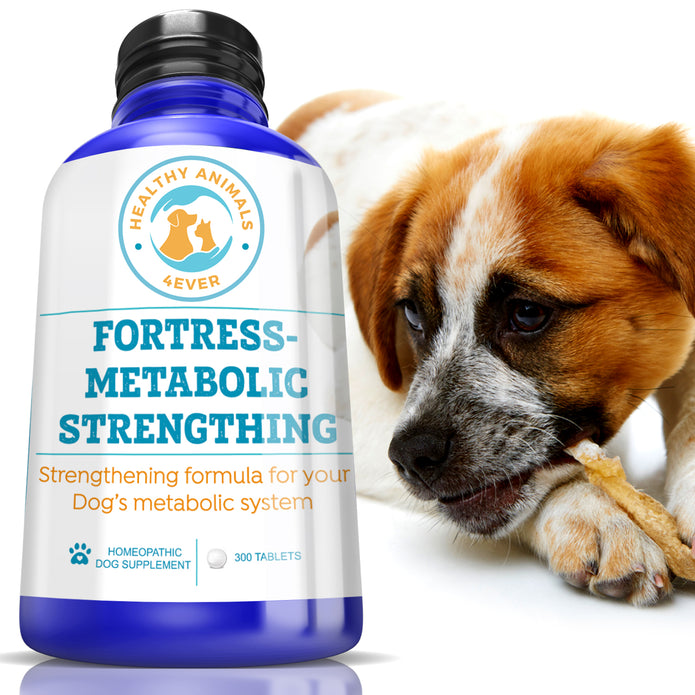
Fortress Metabolic Strengthening is a strengthening formula for your dog’s metabolic system. Promotes the healthy functioning of the liver. Natural support for parasite cleanse & may help with die-off symptoms. All-natural formula. Safe and easy to use.
c. Immune Support
Nutritional Supplements: A well-balanced diet supports your dog's immune system. Consider supplementing their diet with omega-3 fatty acids, which have anti-inflammatory properties and support skin and coat health. Probiotics can help maintain a healthy gut microbiome, which plays a significant role in immune function. Additionally, vitamin E is a powerful antioxidant, protecting cells from damage and supporting immune health.
Exercise and Mental Stimulation: Regular exercise is essential for keeping your dog physically and mentally healthy. Aim for daily walks, interactive play sessions, and engaging activities that stimulate both their body and mind. Exercise strengthens your dog's immune system and helps manage stress and anxiety, which can impact overall health.
d. Homeopathic Support
Homeopathic remedies offer natural and gentle support for addressing seasonal issues in dogs. Here are 9 homeopathic remedies that can complement the tips mentioned earlier:
1. Allergy Relief:
- Apis mellifica: Often used for allergic reactions characterized by swelling and inflammation.
- Natrum muriaticum: Beneficial for dogs with dry, itchy skin allergies.
- Arsenicum album: Commonly prescribed for dogs experiencing allergic dermatitis with intense itching and burning sensations.
2. Parasite Prevention:
- Cina: Frequently indicated for dogs prone to intestinal parasites such as worms.
- Sulphur: May help repel fleas and ticks as a preventive remedy.
- Ledum palustre: Often used for puncture wounds and insect bites, making it a helpful remedy for addressing potential skin irritations caused by parasites.
3. Immune Support:
- Thuja occidentalis: Often recommended for dogs prone to recurrent infections or those experiencing vaccination-related reactions.
- Silicea: Beneficial for dogs with chronic respiratory issues or slow-healing wounds
- Calcarea carbonica: Indicated for dogs who tend to be sluggish or have weak immune responses.

Spring Wellness Tips for Cats
Cats also require special care as the seasons change. Follow our tips to get your cat ready for this spring:
a. Allergy Relief
Understanding Feline Allergies: Cats can be allergic to various environmental allergens, including pollen, mold, dust mites, and specific proteins in their food. Allergies in cats often manifest through symptoms such as itching, excessive grooming, skin irritation, and respiratory issues.
Natural Remedies: Explore natural remedies to alleviate allergy symptoms in your cat. Ingredients like quercetin, which has anti-inflammatory properties, and nettle leaf, known for its histamine-blocking effects, can help reduce allergic reactions without the side effects of conventional medications.
Creating an Allergy-Friendly Environment: Minimize your cat's exposure to allergens by keeping your home clean. Regularly vacuum carpets and upholstery, wash your cat's bedding in hot water, and use air purifiers to remove airborne allergens. If your cat is sensitive to pollen, consider keeping them indoors during high pollen seasons or providing a safe outdoor enclosure.
b. Parasite Prevention
Natural Flea and Tick Control: Fleas and ticks can pose health risks to cats, including transmitting diseases and causing skin irritation. Opt for natural flea and tick control methods safe for feline companions, such as herbal flea collars, essential oil sprays (lavender, cedarwood), or diatomaceous earth powder applied to their bedding and living areas.
Regular Check-ups and Preventive Care: Schedule regular veterinary check-ups for your cat to monitor their health and promptly address parasite concerns. Your veterinarian can recommend safe and effective preventive measures tailored to your cat's needs.
c. Immune SupportFortress Metabolic Strengthening is a strengthening formula for your cat’s metabolic system. Promotes the healthy functioning of the liver. Natural support for parasite cleanse & may help with die-off symptoms. All-natural formula. Safe and easy to use.
Nutrition and Supplements: Provide your cat with a balanced and nutritious diet to support their immune system. Omega-3 fatty acids in fish oil can help reduce inflammation and improve skin and coat health. Probiotics promote a healthy gut microbiome, while vitamin E is a powerful antioxidant, protecting cells from damage.
Stress Reduction Techniques: Cats can be sensitive to environmental changes, which may impact their immune function. To reduce stress levels, create a stress-free environment for your cat by providing plenty of hiding spots, vertical spaces for climbing and perching, and interactive toys to keep it mentally stimulated. Minimize changes in their routine whenever possible.
d. Homeopathic SupportThe following are the best homeopathic remedies for supporting your cat's health this season. Be sure to try them!
1. Allergy Relief:- Arsenicum album: Commonly used for cats experiencing allergic dermatitis with intense itching and burning sensations.
- Natrum muriaticum: Helpful for cats with dry, itchy skin allergies.
- Pulsatilla: Often indicated for cats with watery eyes, nasal discharge, and respiratory symptoms associated with allergies.
2. Parasite Prevention:Sneezing and Wheezing Due to Allergy provides natural support for wheezing, breathing difficulties, cough, and fatigue in cats. Helps decrease allergy intensity and prevent lung damage. All-natural formula. Easy to use.
- Cina: Indicated for cats prone to intestinal parasites such as worms.
- Sulphur: Beneficial for repelling fleas and ticks when used as a preventive remedy.
- Ledum palustre: Commonly recommended for insect bites and puncture wounds, making it helpful in addressing potential skin irritations caused by parasites.
- Thuja occidentalis: Often used for cats prone to recurrent infections or those experiencing vaccination-related reactions.
- Silicea: Beneficial for cats with chronic respiratory issues or slow-healing wounds
- Calcarea carbonica: Indicated for sluggish cats or weak immune responses.

Spring Wellness Tips for Chickens
To improve your chickens' health, provide them with specific care tailored to this season. Here is your guide for chicken care in spring:
a. Respiratory HealthUnderstanding Chicken Respiratory Issues: Chickens are prone to respiratory infections, especially during seasonal transitions when temperature and humidity fluctuate. Chicken respiratory issues include infectious bronchitis, mycoplasma infections, and respiratory viruses.
Natural Remedies: Consider natural remedies to support respiratory health in your flock. Herbs such as oregano, thyme, and garlic have antimicrobial properties and can help boost immunity. Incorporate these herbs into your chickens' diet by adding them to their feed or offering them as fresh treats.
Preventive Measures: Maintain good ventilation in your chicken coop to reduce moisture buildup and prevent the spread of respiratory pathogens. Keep bedding clean and dry, and avoid overcrowding to minimize stress, which can compromise immune function.
b. Parasite PreventionChicken Respiratory Support is dedicated to address persistent respiratory issues over time. With the power of consistent use, your chickens may gradually overcome and recover from prolonged respiratory challenges.
Controlling Mites and Other Parasites: External parasites like mites and lice can infest chicken coops and cause discomfort and health issues for your birds. Implement natural parasite control methods such as diatomaceous earth, a fine powder that disrupts the exoskeleton of parasites, causing them to dehydrate and die.
Coop Maintenance: Regularly clean and disinfect your chicken coop to prevent parasite infestations. Replace bedding frequently, remove any debris or waste, and inspect roosting areas for signs of mites or lice. Add herbs like lavender, mint, or thyme to nesting boxes, which can help repel parasites.
c. Nutrition and Environmental FactorsBalanced Diet: Provide your chickens with a balanced diet rich in essential nutrients to support overall health and immunity. In addition to commercial feed, supplement their diet with fresh fruits, vegetables, and kitchen scraps. Consider offering calcium supplements such as crushed eggshells or oyster shells to support eggshell formation and prevent calcium deficiency.
Healthy Living Environment: Create a clean and enriching environment for your chickens to thrive. Ensure access to clean water and ample space for dust bathing, a natural behavior that helps chickens maintain healthy plumage and control external parasites. Rotate pasture areas regularly to prevent overgrazing and minimize exposure to parasites.
d. Homeopathic SupportChicken Nutritional Deficiency Supplement helps support the digestion and absorption systems within the metabolism, making it a perfect solution to fortify their health and vitality.
Homeopathy can naturally support your chickens’ health and enhance their resilience to seasonal stressors. Here are 9 effective homeopathic remedies to try:
- Respiratory Health:
- Bryonia alba: Often used for chickens with dry, hacking coughs and difficulty breathing.
- Hepar sulphuris calcareum: Beneficial for chickens with rattling coughs and thick, yellow discharge from the eyes and nostrils.
- Kali bichromicum: Indicated for chickens with stringy or ropey nasal discharge and sinus congestion.
- Parasite Prevention:
- Cina: Often recommended for chickens prone to intestinal parasites such as worms.
- Sulphur: May help repel external parasites like mites and lice when used as a preventive remedy.
- Psorinum: Commonly used for chickens with severe itching and scratching associated with parasite infestations.
- Nutritional Support:.
- Calcarea phosphorica: Indicated for chickens with poor growth and weak bones.
- Calcarea carbonica: Helpful for sluggish chickens or those having difficulty maintaining body weight.
- Silicea: Used for chickens with slow-healing wounds or chronic infections.

Spring Wellness Tips for Horses
Horses, being sensitive animals, require care tailored to the changing seasons. Here's everything you need to know to ensure your horses maintain optimal health this spring:
a. Hoof CareUnderstanding Hoof Health: The health of a horse's hooves is crucial to its overall well-being. Hoof problems, such as thrush, cracks, and abscesses, can arise due to various factors, including genetics, environment, and management practices.
Regular Trimming: Establish a consistent schedule for hoof care with your farrier, typically every 6-8 weeks. Regular trimming helps maintain proper hoof balance, prevents overgrowth, and reduces the risk of developing lameness or other hoof-related issues.
Natural Remedies: Besides regular trimming, consider incorporating natural remedies to support hoof health. For instance, applying apple cider vinegar or a diluted tea tree oil solution to treat thrush can help combat bacteria and promote healing. Providing a clean, dry environment for your horse and ensuring proper nutrition is critical in maintaining healthy hooves.
b. Parasite PreventionHoof Issues Support is a natural remedy for hoof-related issues. Helps with cracked hooves, brittleness, and discomfort during movement. Promotes healthy hoof growth while soothing irritation. All-natural formula. Safe and gentle for all horse breeds.
Herbal Deworming Protocols: Traditional chemical dewormers can lead to parasite resistance over time. Herbal deworming protocols offer a natural alternative, utilizing ingredients like garlic, wormwood, and black walnut hulls, which have been shown to have anthelmintic properties. Consult an equine veterinarian or nutritionist to develop a deworming plan tailored to your horse's needs and parasite management practices.
Rotational Grazing: Rotational grazing involves dividing pasture areas into smaller sections and rotating horses between them periodically. This practice helps prevent overgrazing, promotes pasture health, and reduces the risk of parasite transmission by breaking the lifecycle of internal parasites. Additionally, maintaining clean and well-drained paddocks can help minimize parasite exposure.
c. Immune SupportSupplements and Herbs: Supporting your horse's immune system is essential for overall health and resilience. Consider incorporating immune-boosting supplements and herbs, such as echinacea, astragalus, and vitamin C, into your horse's diet. These natural ingredients can help strengthen the immune response and protect against infections, particularly during stress or seasonal changes.
Stress Management: Horses are sensitive animals prone to stress, which can compromise their immune function. Minimize stressors in your horse's environment by maintaining a consistent routine, providing ample turnout time in a safe and stimulating environment, and offering social interaction with other horses. Additionally, consider using calming herbs like chamomile or valerian root to promote relaxation and reduce anxiety. You can brew chamomile or valerian root tea, let it cool, and mix it into your horse's feed or drinking water.
d. Homeopathic SupportIf you want to stimulate your horse's healing mechanisms and strengthen their internal defenses, try the following homeopathic remedies:
1. Hoof Health:- Arnica montana: Used for horses with sore or bruised hooves, particularly after strenuous activity or injury.
- Silicea: May help horses with brittle hooves or slow hoof growth.
- Graphites: Recommended for horses with cracks or splits in the hoof wall.
2. Parasite Prevention:Laminitis Support is a natural remedy for horse Laminitis. Recommended for inflamed hooves, pain, and discomfort. Supports healthy hoof growth. All-natural formula. Suitable for horses of all ages and activity levels. Easy to take.
- Cina: Indicated for horses prone to intestinal parasites such as worms.
- Sulphur: Helpful for repelling external parasites like flies and ticks when used as a preventive remedy.
- Psorinum: Beneficial for horses with severe itching and skin irritation associated with parasite infestations.
- Thuja occidentalis: Often used for horses prone to recurrent infections or those experiencing vaccination-related reactions.
- Silicea: Indicated for horses with chronic respiratory issues or slow-healing wounds.
- Calcarea carbonica: May help horses who are sluggish or have weak immune responses.

The Bottom Line
Incorporating these homeopathic tips and natural remedies into your pet’s care routines can enhance their well-being this spring. Whether it's addressing allergies, preventing parasites, or supporting immune function, natural solutions are available to promote the health and happiness of our pets.
So, let’s take these proactive steps and ensure our pets enjoy the springtime to the fullest.









